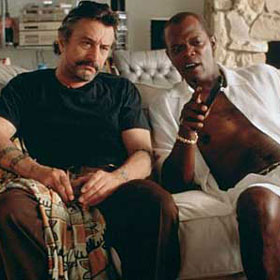Jackie Brown Blu-ray

4/5
Following up a cult hit the likes of Resovoir Dogs, and the subsequent explosive mainstream success of Pulp Fiction was never going to be easy for Tarantino. Given the monumental hype that surrounded every paper napkin he doodled on post-Pulp, that he failed in the eyes of many is not a huge surprise. That Jackie Brown was received so badly by critics and audiences alike – that he all but disappeared and didn't make another film for six years – was, and still is, downright astonishing.
It must have been hard for Quentin not to believe that he could do no wrong when everyone was telling him that he was the second coming. In that light Jackie Brown is something of an enigma. Not as gritty or cool as Reservoir Dogs and not as funny or as stylish as Pulp Fiction. It was, simply put, too ordinary and straightforward to satisfy people’s expectations of the man at that time. It is also, in retrospect, his most mature and disciplined film by a comfortable margin.
Ordell Robbie (Jackson) is a small time gunrunner who along with his new partner Louis (DeNiro) is looking to make a big score and get rich so they can disappear somewhere exotic. When his money mule, the eponymous Jackie Brown (Grier), is busted by ATF agent Ray (Keaton) bringing in a shipment, Ordell sends bail bondsman Max (Forstor) to go get her. Striking up affection for one another Max and Jackie devise a way to make off with Ordell's Mexican money stash and leave him in the hands of the authorities.
Given his body of work both pre and post, this film is a huge testament to the restraint of possibly the most self-indulgent filmmaker alive. Nothing about Jackie Brown is trademark Tarantino. It is largely in sequence, except for when it’s absolutely necessary to jump back a few minutes to slot another piece into the narrative. There is almost no comedic violence, save for one forgivable moment, and the oh-so-Quentin pop-culture banter that you either adore or despise is entirely absent.
The result is a straightforward, densely layered, smalltime crime drama that's driven by genuine character rather than a series of increasingly convoluted incidents. Grier is fine as the world-weary mule who plays to her strengths but knows her limitations. Jackson tones the volume down to a comfortable level and makes Ordell a good villain to watch, who has no more of a desire for trouble than Jackie herself.
In contrast, De Niro's character could have been played by a sandbag and it is pure vanity that he was ever in the picture – satisfying only personal needs on both sides at that time to be able to say that they worked with each other. Forster shines as the bail bondsman determined to do what’s right even though it is against the law. And Jackie Brown, if approached correctly, is a very satisfying film. That Tarantino ultimately swung so far back the other way with the outright carton that was Kill Bill is very telling of the man’s insecurity and need for approval. Back then at least he could seemingly only gauge the quality of his own material in terms other people’s appreciation of it.
Blu-ray Special Features:
This impressive blu-ray release boasts over three hours of special features. Behind the scenes featurettes and retrospectives include; Breaking Down Jackie Brown, Jackie Brown: How It Went Down (interviews with Pam Grier, Quentin Tarantino, Robert Forster, Samuel L. Jackson, Robert De Niro, Bridget Fonda, Michael Keaton, Elmore Leonard and crew), A Look Back at Jackie Brown, Chicks With Guns (video), Siskel and Ebert At The Movies (Jackie Brown review), Jackie Brown on MTV, galleries, trivia tracks, deleted and alternate scenes.
RELATED ARTICLES
Get the most-revealing celebrity conversations with the uInterview podcast!







Leave a comment